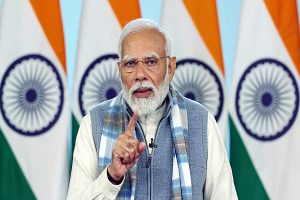With the Supreme Court yet to pronounce its verdict on the revocation of Article 370 from Jammu and Kashmir, National Conference leader and former chief minister Omar Abdullah on Wednesday vowed to continue with the political pushback to the move regardless of legal interventions and decisions.
“We were the first to move the Supreme Court (challenging the revocation of Article 370 from Jammu and Kashmir). Thereafter, the others, too, adopted a similar recourse. Irrespective of what the Supreme Court eventually decides, our political fight will continue,” Abdullah told reporters at Kulgam in Jammu and Kashmir on Wednesday.
The apex court is likely to announce its verdict on a batch of petitions challenging the abrogation of Article 370 and its corollary Article 35-A, which provided special constitutional guarantees to Jammu and Kashmir.
Unleashing an attack against the BJP-led Central government, Abdullah said earlier that it soured the relations between the people of Jammu and Kashmir and the rest of the country with its decision to abrogate provisions under Article 370.
The NC leader, while speaking to media persons, said no one was happy with the decision to revoke the special status of the erstwhile state.
The Centre abrogated the special status of Jammu and Kashmir under Article 370 on August 5, 2019, shortly into the second term of the BJP-led National Democratic Alliance (NDA) government under the leadership of Prime Minister Narendra Modi.
Enshrined in the Constitution on October 17, 1949, Article 370 exempted the erstwhile state of Jammu and Kashmir from the provisions of the Constitution (except Article 1 and Article 370 itself) and permitted the state to draft its own Constitution.
The long pending case challenged the government’s decision to repeal the special status of Jammu and Kashmir under Article 370.
The case also challenged the Jammu and Kashmir Reorganisation Act, through which the erstwhile state was bifurcated into two Union Territories — Jammu and Kashmir and Ladakh.












